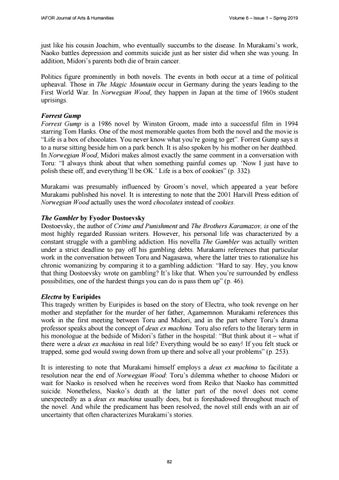IAFOR Journal of Arts & Humanities
Volume 6 – Issue 1 – Spring 2019
just like his cousin Joachim, who eventually succumbs to the disease. In Murakami’s work, Naoko battles depression and commits suicide just as her sister did when she was young. In addition, Midori’s parents both die of brain cancer. Politics figure prominently in both novels. The events in both occur at a time of political upheaval. Those in The Magic Mountain occur in Germany during the years leading to the First World War. In Norwegian Wood, they happen in Japan at the time of 1960s student uprisings. Forrest Gump Forrest Gump is a 1986 novel by Winston Groom, made into a successful film in 1994 starring Tom Hanks. One of the most memorable quotes from both the novel and the movie is “Life is a box of chocolates. You never know what you’re going to get”. Forrest Gump says it to a nurse sitting beside him on a park bench. It is also spoken by his mother on her deathbed. In Norwegian Wood, Midori makes almost exactly the same comment in a conversation with Toru: “I always think about that when something painful comes up. ‘Now I just have to polish these off, and everything’ll be OK.’ Life is a box of cookies” (p. 332). Murakami was presumably influenced by Groom’s novel, which appeared a year before Murakami published his novel. It is interesting to note that the 2001 Harvill Press edition of Norwegian Wood actually uses the word chocolates instead of cookies. The Gambler by Fyodor Dostoevsky Dostoevsky, the author of Crime and Punishment and The Brothers Karamazov, is one of the most highly regarded Russian writers. However, his personal life was characterized by a constant struggle with a gambling addiction. His novella The Gambler was actually written under a strict deadline to pay off his gambling debts. Murakami references that particular work in the conversation between Toru and Nagasawa, where the latter tries to rationalize his chronic womanizing by comparing it to a gambling addiction: “Hard to say. Hey, you know that thing Dostoevsky wrote on gambling? It’s like that. When you’re surrounded by endless possibilities, one of the hardest things you can do is pass them up” (p. 46). Electra by Euripides This tragedy written by Euripides is based on the story of Electra, who took revenge on her mother and stepfather for the murder of her father, Agamemnon. Murakami references this work in the first meeting between Toru and Midori, and in the part where Toru’s drama professor speaks about the concept of deux ex machina. Toru also refers to the literary term in his monologue at the bedside of Midori’s father in the hospital: “But think about it – what if there were a deux ex machina in real life? Everything would be so easy! If you felt stuck or trapped, some god would swing down from up there and solve all your problems” (p. 253). It is interesting to note that Murakami himself employs a deux ex machina to facilitate a resolution near the end of Norwegian Wood: Toru’s dilemma whether to choose Midori or wait for Naoko is resolved when he receives word from Reiko that Naoko has committed suicide. Nonetheless, Naoko’s death at the latter part of the novel does not come unexpectedly as a deux ex machina usually does, but is foreshadowed throughout much of the novel. And while the predicament has been resolved, the novel still ends with an air of uncertainty that often characterizes Murakami’s stories.
82
